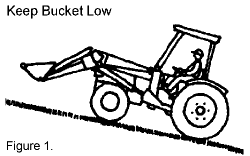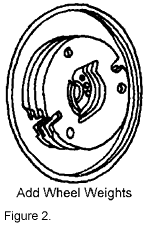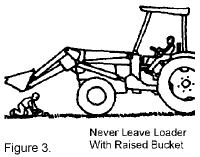 Loaders are versatile and can be a valuable tool for farm
work. But because they change the center of gravity and stability
of the tractor-loader combination, they can also be dangerous
if they are not operated properly. Changing the center of
gravity presents a potential tipping hazard for the operator.
Loaders are versatile and can be a valuable tool for farm
work. But because they change the center of gravity and stability
of the tractor-loader combination, they can also be dangerous
if they are not operated properly. Changing the center of
gravity presents a potential tipping hazard for the operator.
A few
general precautions will reduce the chance of an accident
with a loader.
- Read
and follow directions in your operator's manual for your
tractor and loader. Be sure the loader is installed correctly
and does not exceed your tractor's handling capacity.
- Keep
the bucket low while carrying loads and when operating on
hills (Figure 1). A hole or sudden bump can easily upset
your tractor if the bucket is carried high. The higher the
bucket is carried, the greater the danger of an upset. With
loaded buckets, drive forward when going uphill. Back downhill
with loads.
- Travel
slowly. Be careful when turning with loads, especially those
that may shift or slide.
- Add
extra weight on the rear of your tractor to counter-balance
the weight of the load on the front (Figure 2). Check your
operator's manual for specific recommendations.

- Keep
the tractor wheels spread as widely as possible. Avoid using
loaders on tricycle-type tractors, since the chances of
a side upset are increased.
- Load
the bucket evenly and avoid overloading to prevent upsets.
The capacity of the loader is specified in your operator's
manual.
- Watch
where you are going. Avoid holes, rocks, loose fill, or
any other obstacle which could upset the tractor. If working
inside buildings, watch for low ceiling beams and doorways
to prevent being pinned or crushed between them and the
tractor. Also, be sure there is adequate ventilation so
carbon monoxide from the tractor engine will not build up.
- Do
not try to operate the hydraulic controls from beside or
behind the tractor. Operate only from the tractor seat so
you will have full control over the entire machine.
- Use
the loader only for its specific purpose. Never use it for
such things as removing fence posts, towing, or to knock
something down. Never allow people to ride in the bucket.
If the tractor is to be used in tillage operations, remove
the bucket first.
- Lower
the bucket to the ground when you leave the machine (Figure
3). This will keep children or others from accidentally
lowering it and injuring someone.

- A
tractor with a roll-over protection structure and seat belts
will provide you the greatest protection.
If You
Are Under 16 ....
- A
federal child labor law affects you. Unless you are working
for your parent or guardian on a farm owned or operated
by that parent or guardian, you are not permitted to operate
a tractor over 20 pto hp, and certain other farm machinery,
although some of these jobs can be started at age 14 with
special training.
- Persons
under 14 may be hired to do any job that is not classified
as particularly hazardous if they have the written consent
of their parent or guardian. There is one exception: youngsters
under 12 are not permitted to work on farms that used 500
or more man-days of farm labor during any quarter of the
preceding calendar year.
Publication #: SA - 12.2
West Virginia Cooperative Extension Service, West Virginia
University.
Thomas
L. Bean, Extension Specialist, Agricultural Safety, West Virginia
University, Extension and Public Service, Morgantown, West
Virginia.
Disclaimer and Reproduction Information: Information in
NASD does not represent NIOSH policy. Information included in
NASD appears by permission of the author and/or copyright holder.
More
 Loaders are versatile and can be a valuable tool for farm
work. But because they change the center of gravity and stability
of the tractor-loader combination, they can also be dangerous
if they are not operated properly. Changing the center of
gravity presents a potential tipping hazard for the operator.
Loaders are versatile and can be a valuable tool for farm
work. But because they change the center of gravity and stability
of the tractor-loader combination, they can also be dangerous
if they are not operated properly. Changing the center of
gravity presents a potential tipping hazard for the operator.

